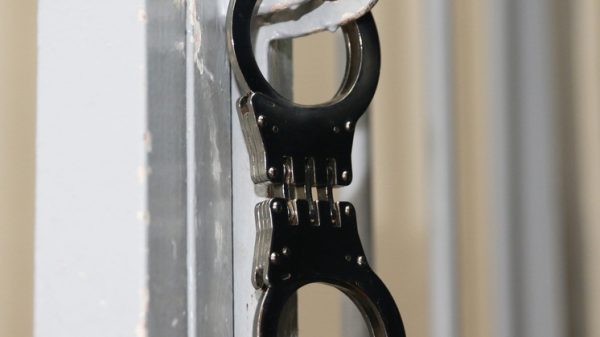 Eddie Redmayne in Fantastic Beasts and Where to Find Them Photo: Jaap Buytendijk/Warner Bros.
Eddie Redmayne in Fantastic Beasts and Where to Find Them Photo: Jaap Buytendijk/Warner Bros.
This year, bar one After the biggest disappointment in its 77-year history, Bafta will praise Christopher Nolan and Oppenheimer in what is likely to be a dress rehearsal for next month's Oscar ceremony. While Nolan and his film are worthy and deserved winners, it's hard not to feel a slight sense of weariness at the almost inevitable coronation, especially since the Baftas have, shall we say, a reputation for throwing curve balls.
The last time there was a truly surprise award was in 2022, when Joanna Scanlan deservedly won Best Actress for her role in the low-budget British film After Love; The Oscar that year went to Jessica Chastain for her role as Tammy Faye, and Scanlan and her film weren't even nominated.
Historically, the Bafta Awards have always been intended to be a celebration and recognition of British cinema, and this could often be seen as having a provincial and narrow-minded attitude when it comes to nominations. Looking back, especially over the last few decades, there are a number of people who have received recognition—and in some cases even won—who seem puzzling, even perverse, candidates for that recognition.
As Bafta have tried to re-examine their awards rights over the last couple of years, it's possible we may never see some of these bizarre and perverse nominations again. It's a huge shame for any connoisseur to watch a distinguished awards organization go a little crazy in public. Here are ten cases where Bafta made decisions for reasons best known to themselves, and the rest of us can only guess why.
1. The Bourne Ultimatum nominated for Best British Film (2008)
Matt Damon's third Jason Bourne film is widely regarded as the series' high point, a tense and fast-paced film directed with the utmost flair and skill by Paul Greengrass. It was only fitting that he was recognized at the 2008 BAFTA Awards and was nominated for the Greengrass Award for Best Director along with a number of technical categories; it deservedly won the award for best editing and best sound. However, there was one truly strange nomination: Best British Film.
 Matt Damon in The Bourne Ultimatum
Matt Damon in The Bourne Ultimatum
Not only was it largely financed by American studio Universal with some German money, but other than the presence of British Greengrass and a memorable early set at London's Waterloo Station, it doesn't even have any connections to the United Kingdom. . A technical error or a desire to recognize a great film in a less competitive category than Best Picture? Who knows.
2. John Hurt nominated for Alien (1980)
Ridley Scott's breakthrough Alien remains a masterpiece of sci-fi horror four decades after its release and one of the most influential films ever made. However, few would call it an actor's show; By far the most memorable performance comes from its leading lady, Sigourney Weaver's Ripley, who gets to do a lot more in the eventual Aliens sequel. However, at the 1980 Baftas, John Hurt, who had won Best Supporting Actor for Midnight Express the previous year, was nominated again for his role as the ill-fated Kane.
 John Hurt in Alien Photo: Corbis via Getty Images
John Hurt in Alien Photo: Corbis via Getty Images
Although he has an impressive death scene that is more a feat of special effects than acting, it's hard to call Hurt (who replaced an unwell Jon Finch) truly indelible in the role. Either way, he lost to Robert Duvall for his amazing performance in Apocalypse Now.
3. The entire list of best supporting actors (2002)
For some strange reason, the members of Bafta decided to abruptly abandon the circuit when it came to the 2002 awards. Jim Broadbent found himself in a unique position that year: he won an Oscar for his sensitive, moving performance as John Bailey in the biopic Iris and was awarded a Bafta for his incredible showmanship as the impresario Ziegler in Moulin Rouge; he wasn't even nominated for «Iris,» although his co-star Hugh Bonneville, who played young Bailey, was nominated.
Yet it is the other members of this category who are the real cutthroats. Robbie Coltrane — a regular BAFTA winner for his roles in Cracker — was nominated for his charming but hardly revelatory work in the first Harry Potter film, Harry Potter and the Sorcerer's Stone, while Colin Firth was in the running for his prim looks. as Mark Darcy in the first Bridget Jones's Diary, rather than as his much more charismatic and interesting co-star Hugh Grant in the same film.
 Shrek with Best Supporting Actor nominee Eddie Murphy as Donkey
Shrek with Best Supporting Actor nominee Eddie Murphy as Donkey
And the weirdest thing is, Eddie Murphy was nominated for a Bafta for his vocal work in Shrek; his Donkey was very funny, but worthy of a reward? Hardly. Meanwhile, the Oscars celebrated far more memorable performances, including Ben Kingsley in Sexy Beast, Ian McKellen's Gandalf in The Fellowship of the Ring and Ethan Hawke in Training Day: a shining example of how the Academy got it right, and Bafta — no.
4. «Nocturnal Animals» Almost Wins (2017)
The sequel to director-turned-Tom Ford's acclaimed A Single Man did not receive the same level of recognition as its debut. Most critics were split between praising the film's ambition and describing it as Victoria Coren-Mitchell's «piece of gynophobic death porn.» It received limited attention at the Academy Awards, where Michael Shannon was nominated for Best Supporting Actor, and at the Golden Globes, where Aaron Taylor-Johnson won in the same category. But when it came to the Bafta Awards, the organization practically rolled out the red carpet for Ford and his film when it came to praising him.

Nocturnal Animals received no fewer than nine nominations, including Best Actor for Jake Gyllenhaal, Best Director and Best Adapted Screenplay for Ford, as well as numerous technical awards. It's hard to tell whether Bafta really believed it was one of the standout films of the year or were just desperate for Ford to appear at the ceremony, but when the actual awards were handed out the film went home empty-handed, beaten by La La. Land in most nominated categories.
5. Zero nominations for Best Director (1986)
The Best Director award is traditionally the second most prestigious award at the ceremony, second only to Best Film in importance and importance. It is therefore extremely strange that at the 39th Bafta Awards in 1986 there was simply no Best Director award or shortlist. Not that there weren't enough opportunities this year: Woody Allen won Best Picture for The Purple Rose of Cairo, as did Robert Zemeckis (Back to the Future), Milos Forman (Amadeus), Peter Weir (Witness «) and David Lean («A Passage to India») would also be worthy honorees, as this was one of the strongest directing talents of the decade.
 Neglect: Harrison Ford on the witness stand Photo: Alamy
Neglect: Harrison Ford on the witness stand Photo: Alamy
There is an explanation, although it is not particularly convincing. According to a Bafta spokesperson, “The Best Film and Director categories were combined into the Film category at the 1986 Film Awards. The producer and director were awarded Best Picture that year.» It was more of an odd decision than a groundbreaking one, and it's no surprise that the directing award was reinstated the following year when Allen won for Hannah and Her Sisters.
6. Eighteen nominations for Best Picture (1962)
In most cases, Bafta nominates five or six films for Best Film, allowing the spotlight to shine on the outstanding films of the past year, although the Best British Film award also recognizes some excellent but overlooked films. , too much. However, in the early years of the award, Bafta allowed a huge number of films to be nominated in this category, leading to what can only be described as a mild form of chaos.
 Omar Sharif and Peter O'Toole in the film «Lawrence of Arabia.» Photo: Alami
Omar Sharif and Peter O'Toole in the film «Lawrence of Arabia.» Photo: Alami
In 1957, for example, everything from Laurence Olivier's decidedly lightweight The Prince and the Showgirl to the forgotten thriller Windom's Way were in contention for the same award as Robert Bresson's existential classic The Runaway Man and Kubrick's Paths of Glory . After a particularly wide field of 18 nominees in 1962, in which Lawrence of Arabia beat out the likes of Jules and Jim, Lolita and West Side Story, the category was trimmed, first to a more manageable 12 the following year, and then, starting in 1964, a much more rigid four or five categories emerged, usually (though not always) recognizing the best films of the year rather than makeweights.
7. The Full Monty on L.A. Secrets and the Titanic (1998)
There can be no doubt that The Full Monty, which was for a time the highest-grossing film in UK history, is a hugely entertaining and uplifting comedy that deserves the acclaim it receives. However, one of the tendencies that Bafta has always had is to roll out the red carpet for British films (and talent) that it feels should be recognised, while ignoring far more superior and important works of cinema.
 The Full Monty
The Full Monty
Instead of giving The Full Monty the Best British Film award it clearly deserved, it was awarded Best Picture over the much more important L.A. Confidential and Titanic. In a bid to hand him as many prizes as possible, Robert Carlyle and Tom Wilkinson received Bafta awards for their performances, which even they might admit were not necessarily their most deserving work. It's funny that Titanic, which won an Oscar that year, didn't win a single Bafta; This is perhaps proof that James Cameron's giant made less of an impression on voters than many others at the time.
8. Fantastic Beasts nominated for Best British Film
Bafta has always had a tendency to praise successful British exports in its categories. Both Harry Potter and the Philosopher's Stone and series highlight Harry Potter and the Prisoner of Azkaban were nominated for Best British Film, and many have speculated that the final film, The Deathly Hallows, should have received the same rating, perhaps even become a worthy winner. This did not happen, and so, perhaps in recognition of this, the first of the Fantastic Beasts spin-offs, Fantastic Beasts and Where to Find Them, was nominated in this category in 2017, along with a host of technical awards.

There was only one small problem with it, and it had nothing to do with the subsequent controversies in which its creator JK Rowling was involved; it really isn't a very good movie and doesn't deserve that kind of recognition. Although the film was a major box office success, it grossed significantly less than the Harry Potter franchise before subsequent films were financial and critical failures. It lost out to Ken Loach's I, Daniel Blake, a film that couldn't have been more unusual, with no fantastic beasts or flashy special effects. In the year that Mel Brooks received a Bafta scholarship, it's hard not to wonder if anyone, somewhere, was laughing.
9. Judi Dench for absolutely everything (different years)
Bafta has certain actors that it likes to constantly recognize, resulting in an almost talismanic effect. The great Denholm Elliott, for example, was nominated for a Bafta seven times between 1973 and 1986 and won three years in a row, from 1983 to 1985. And yet it was Dame Judi Dench who was praised by Bafta more than any other performer, with the exception of the equally ubiquitous Meryl Streep. After Dench first voted the most promising newcomer to film's leading roles in 1965 for her performance in Four in the Morning, she had to wait two decades to get her due, but then it all but fizzled out. Between 1985 and 2013, Dench was nominated for Best Actress or Best Supporting Actress a staggering 14 times, winning five of them.
 Juliette Binoche and Judi Dench in chocolate Photo: AP
Juliette Binoche and Judi Dench in chocolate Photo: AP
Some of these awards were well deserved, such as her brief but scene-stealing turn as Elizabeth I in Shakespeare in Love, but many others felt rotely predictable, especially since many of the nominations came for her lukewarm performance in Harvey Weinstein. . -produced such prestigious films as Chocolat and The Shipping News. Dench has remained active in acting over the past decade, but for some reason Bafta fell out of love with her, and her performance in 2013's Philomena is the last time she received recognition. However, her continued status as one of Britain's best-loved actresses is certainly compensation for not being nominated for, say, a Victoria and an Oscar. Abdul or Belfast.
10. Extremely Random Best Supporting Actress Awards (Various Years)
Bafta has always played its game relatively straight when it comes to the Best Actor and Best Actress categories, but when it comes to the Best Actress category second plan,” it is often difficult to wonder what her voters were thinking. John Boorman's excellent Hope and Glory won Susan Wooldridge a Bafta, but Sarah Miles and Sammy Davis' much more memorable work in the same film wasn't even nominated.

And so on; veteran character actress Elizabeth Spriggs was inexplicably shortlisted for her brief role in Sense and Sensibility (losing out to co-star Kate Winslet), Maria Aitken was nominated for her appearance in A Fish Called Wanda for a few minor scenes as John Cleese. strict wife. And that's before we even made the bizarre decision to award Rosanna Arquette Best Supporting Actress for her starring role in Desperately Seeking Susan.
Sanity has largely prevailed since the turn of the new millennium — you have to go back to Maggie Smith, who won a truly strange award in this category in 1999 for Tea with Mussolini — but this is another reminder of Bafta's inner eccentricity. It may be a more attractive and corporate organization now, but perhaps something quintessentially British has been lost in the process.


























































Свежие комментарии